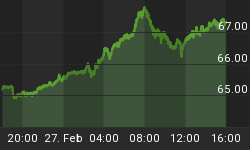Marc Faber, publisher of the Gloom, Boom and Doom Report, spoke to Bloomberg Television's Betty Liu this morning and said that the "Japanese market may outperform all the other markets against all expectations in 2012."
Faber said that investors "should be very careful at this stage" because he believes that "earnings may begin to disappoint" and "corporate profit margins could deteriorate." Also that "the economy has bottomed out, but is far from robust."
Faber on whether he's finding more shorts in the equity market:
"In a money-printing environment I'm reluctant to short. But say whereas I recommended investors to increase their positions last October, November, December, now I think that if people are overweight in equities they should reduce positions somewhat...maybe cash. The U.S. dollar is desirable at the present time. And we have to say one thing. The market consists of thousands of stocks and the market consists of many different stock markets globally. The S&P has done exceptionally well relative to, say, emerging economy stock markets, most of which are still lower than they were in 2011. So, if you look at the advance-decline line of all the share markets in the world, then it is definitely being deteriorating. And I happen to believe that money printing will continue and I would probably buy financial shares and I believe that the Japanese market may outperform all the other markets against all expectations in 2012."
On saying that earnings will deteriorate and profit margins will shrink:
"First, I think there are some cost pressures creeping in terms of rising raw material costs, especially energy, and the problem with, say, a QE3 would be that you are doing it in an environment of very elevated oil prices. So, maybe the energy prices would go up more and squeeze the margins of some corporations. And certainly squeeze the consumer. And my sense is that the economy has bottomed out but is far from robust because the typical household is being squeezed by higher cost of living increases. There are various measurements. You can measure the CPI. It is rising by less than 3%. Everywhere I look I see households essentially paying between 5% to 10% more for goods and services than a year ago."
On whether Q2 will be as strong as Q1 for investors:
"I think that if you look back at a year ago we made a peak of 1370 on S&P on May 4 and then dropped sharply to 1074 on October 4. Then we recaptured the lows in November and December. Since then, the first quarter has been very powerful and has surprised investors because of its strong performance. And I think now the expectations are very high. The market is no longer oversold the way it was in December. And everybody thinks that the race is on, go along with equities, the hedge funds have positioned themselves on the long side and optimism is high. I would be very careful at this stage."
On why investors should have caution:
"Basically I think that earnings may begin to disappoint. That corporate profit margins could deteriorate. And I think we still have a lot of issues. Don't forget we have QE1, QE2 and Operation Twist. I think in order to really hold asset prices across the board much more QE3 would have to be gigantic. I'm not ruling out that stocks can continue to go up but I doubt they will go up at the same rate as the first quarter. And if you look at the technical under underpinnings of the market, they have deteriorated. The list of new highs is deteriorating. The short positions are way down. And we have an overbought condition in the market if we measure the number of stocks above the 50-day and 200-day moving average. So, generally I would say maybe April is traditionally still a month of seasonable strength but somewhere in the next six months I think you can buy the whole market much cheaper."
On QE3 having to be "enormous":
"It would have to be very significant to boost all asset prices including homes, stocks, bonds and commodities...Much larger [than QE1 and QE2]."
On why he's not recommending to buy more gold:
"As you know, I have been very positive about gold and I still accumulate gold every month. But I think that we had an intermediate peak at $1921 on September 6 of last year. Then we dropped sharply to $1,522 an ounce on December 29, 2011. Since then we've had a feeble recovery. I think that the correction period is not yet over. I'm not selling my gold because I don't trust governments and I don't trust the Federal Reserve, nor would I trust the ECB or other money traders in the world. They are all going to print money. I still recommend to hold gold."
On bad returns for gold in Q1:
"Yes, that's correct. But the returns have been very good since 1999 and year over year I think gold is still up 12%...I think that gold is in a correction period and we had an intermediate peak on September 6, 2011. And I always advise don't put all your money into gold because it doesn't have any cash flow. So you are really dependent on the price appreciation. That is different from owning, say, equities that have a dividend yield of 5%, which I can find in Asia."















